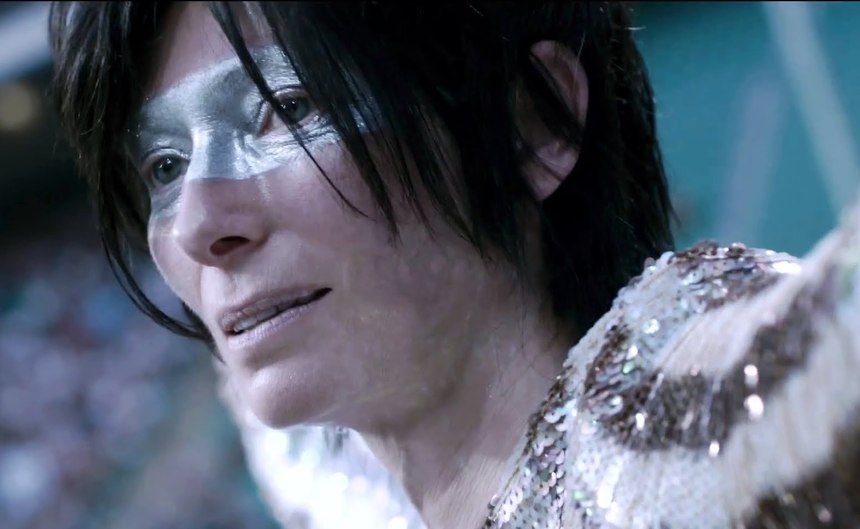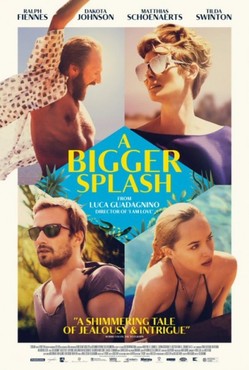Review: A BIGGER SPLASH Makes A Brazen Dive

"...We got a little lost."
Yes, I'll say you did.
The former pronouncement comes as two of the four main characters of A Bigger Splash arrive hours late to dinner after an, ahem, exploratory dalliance amid the exotic nearby landscape. The excuse is as transparent as it is broad, but of course also spiritually true. Throughout the two-hour course of director Luca Guadagnino's follow-up to 2009's art house splash, I Am Love, all four of these characters will become at the very least "a little lost."
Wealthy, affluent, disassociated people are they, each to varying degrees. These characters, as unappealing they might be, are memorable, even resonant. They are not, however, what one would consider "good people". Don't mistake their frequent lack of clothes for a bare humanity.
Hailing from a big-timer's rock n' roll life - that exhausted brand of transcontinental decadence and loss of self that was played out decades ago when the creative templates for this movie were fresh, we have the aging rock superstar (Tilda Swinton), her former producer/paramour (Ralph Fiennes), her current lover (Matthias Schoenaerts) and the producer's grown daughter (Dakota Johnson). They arrive in an island in Sicily to lounge about, swim, listen to music, dance, swim, lay out, get laid, and swim. These things happen, but not as envisioned by the participants.
A Bigger Splash, named in part after David Hockney's famous 1967 poolside painting, is blatant about it's expectation for artistic engagement, and its rootedness in that world. Hackles go up when movies present themselves as art over entertainment, but through it, Guadagnino brings a yearning for roundabout character exploration to the table. His actors are more than game (getting a trip to Pantelleria Island in Sicily out of it can't hurt) and his formidable visual sense is guided by his desire to unblinkingly hash these people out.
In a movie that can and will be accused of rampant pretentiousness, it's only viable guilt in that area falls in line with Swinton's character, Marianne Lane. We're told she's a Bowie-esque legend (fitting, as she's performed in one of the late musical god's videos), and for good measure, we're shown a moment of her taking the stage for a stadium show, the crowd roaring.
But then, the movie does that cloyingly self-clever thing of never making good with her actual music. Amid lavish meals, awkward interactions, occasional sex, and lots of time in the pool, everyone simply talks about how great and famous she is. For good measure, she's just had throat surgery – she's the only one who isn't talking much at all. Rock n' roll may never die, but it's definitely being silenced.
Much has been made of Ralph Fiennes performance as oily music industry insider Harry Hawkes, a greasy self-important cult of personality who's somehow made his way in the business for too many years. For all his apparent jet-setting and money money money, his biggest overplayed claim to fame, his personal “greatest hit” tale to regale again and again, is one of how he slyly innovated the use of a percussive trash can to get around around a “no drums!” edict from Keith Richards when the Rolling Stones were recording their 1994 album “Voodoo Lounge”.
He's clearly an annoying jerk who exhausts the company he attracts. As his quest to reclaim his lost love Marianne becomes clear as his motivation for crashing her vacation, the true depths of his character are slowly revealed: It's true, he's putrid… ghastly... vile... Someone who let go of his own soul long ago, maybe back in Zabriskie Point. All the while, it's obvious that Fiennes is having the time of his life with this role, prolonged naked dancing and all.
Then there's Dakota Johnson as his daughter Penelope, searing the screen with a seduction that could be best described as an intense slow-burn. Her presence isn't only to radiate sexual heat and prance around in see-through tops, blonde hair, and short shorts, even if that is mostly what she does. She is bored, targetting… Is she in cahoots with her father? Does she care?
When the genetic fairies were doling out moral compasses, Penelope's was handed down from Harry, her mostly-absentee daddy. Johnson is not a dismissible talent by any stretch, and this part does give her more to sink her teeth into than her unjustified inescapable resume dominator Fifty Shades of Grey, or tripe like How to be Single. Her doings aren't pleasant, but her character is layered enough to earn the describer of “captivating”, as opposed to just “sexy”. Whether the kind of captivating we want includes uncomfortably inappropriate karaoke with her father is a question viewers must face.
For those with the memory/knowledge/hazy notion of it all, this film is an earnest harkening back to that glorified/cast-aside age when "World Cinema" meant something. Fifty, sixty years ago, when conventional values were being questioned, and the struggle between modernism giving way to the postmodern had a fatalistic vibrancy.
This was the age of Michelangelo Antonioni, Federico Fellini, and Ingmar Bergman. Later, there would be others such as Marco Ferreri. These filmmakers pushed the boundaries of audience sensibilities and of the medium itself. They were widely written about, discussed, and debated. Today, they seem to be all but forgotten.
And yet, we have A Bigger Splash. It is the kind of movie, with its fancy-pants cast and locale, that's built to headline film festivals by the dozens, but offers precious little to conventional audiences. The poster promises sexy, colorful fun, but forgets to mention the alienation, emptiness, and real-world consequences that come along with it. There's precious no one to “root for”, forward momentum is, for much of it, non-existent, and the plot… What plot? It gives what it gives, and lives or dies by that alone.
And good on it for that. In a box office-driven world where it's reported with alarming intensity that movies like this one can't and don't get made anymore, this is proof that somehow, they still can. One's receptive milage will vary greatly, but let's not let that get in the way of proclaiming the movie for its polarizing qualities... Cinephiles owe it to themselves and each other to take a chance on films like this, then move forward with the discussions and debates that are inclined to follow.
A Bigger Splash may not occupy the deep end of the cinematic pool they way that it wishes to, but it's splash-back remains bigger than most, and a worthwhile if unconventional dip for adventurous moviegoers who don't mind getting a little lost.









